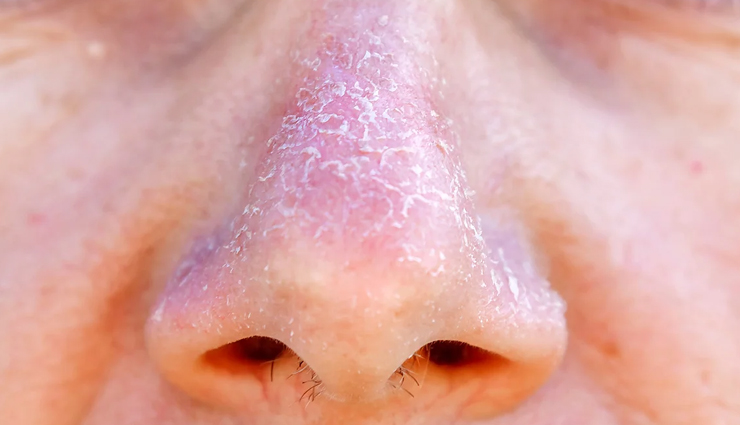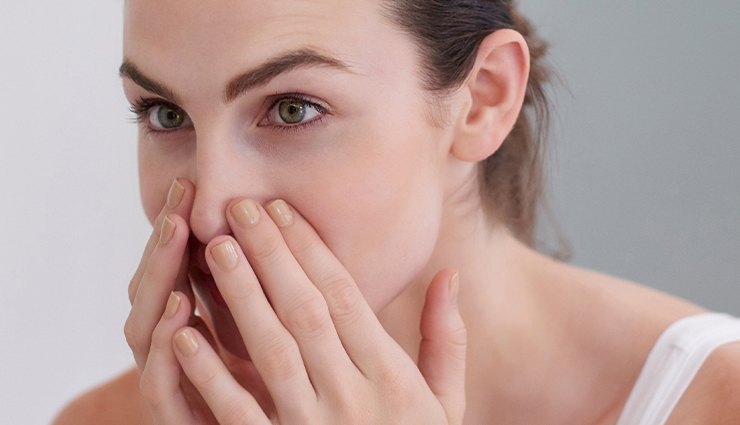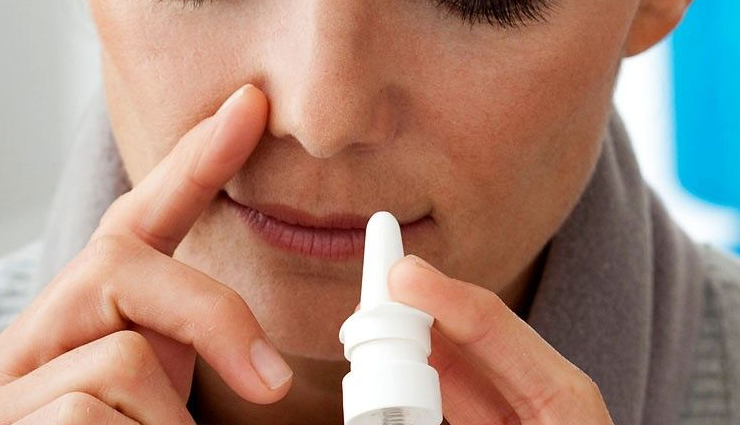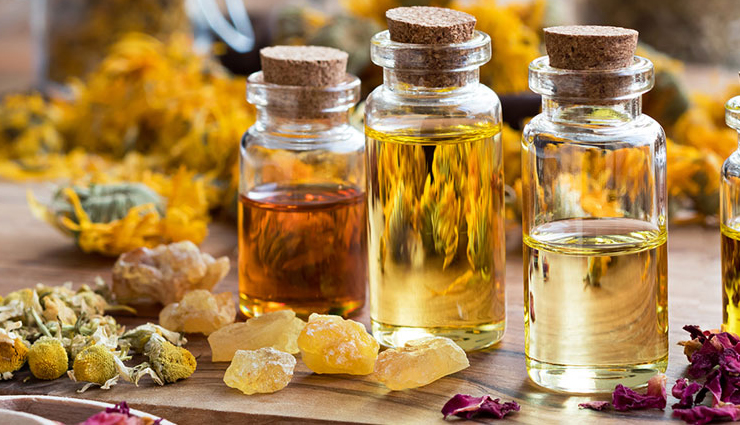Natural Remedies To Try For Dry Skin Around The Nose
By: Priyanka Maheshwari Fri, 01 Sept 2023 3:38:15

Dry skin around the nose is a common dermatological issue that many individuals experience at some point in their lives. The skin around the nose is relatively delicate and can be prone to dryness due to a variety of factors, including environmental conditions, personal habits, and underlying skin conditions. This dryness can lead to discomfort, flakiness, redness, and even irritation. Understanding the causes, symptoms, and potential remedies for dry skin around the nose can help individuals manage and alleviate this issue effectively. It's important to note that persistent or severe dryness might require consultation with a dermatologist for proper diagnosis and treatment recommendations.
If you adhere to the basic principles of skincare, it's likely that you moisturize your face twice daily. Despite maintaining the smoothness and suppleness of the rest of your face, addressing a specific problem proves challenging: the occurrence of dry skin around the nasal area. Even with the application of top-notch facial moisturizers, the skin encircling your nose might still retain its dry, flaky, and uncomfortable texture. Thus, let's delve into the various factors contributing to this dryness around the nose and explore potential remedies. Continue reading for more insights!
Causes for Dry Skin Around The Nose
* Environmental Factors: Exposure to harsh weather conditions, low humidity levels, and cold air can strip the skin of its natural moisture, leading to dryness around the nose.
* Overwashing: Washing the face excessively or using hot water can disrupt the skin's natural oils, leaving the sensitive skin around the nose dry and irritated.
* Skin Conditions: Skin conditions like eczema, psoriasis, or seborrheic dermatitis can cause dry patches and inflammation, often affecting the area around the nose.
* Allergies: Allergic reactions to certain skincare products, detergents, fragrances, or even foods can result in dry, red, and itchy skin around the nose.
* Frequent Nose-Wiping: Regularly wiping or blowing the nose, especially during colds or allergies, can lead to friction and irritation, causing dryness.
* Medications: Certain medications, such as those for acne or allergies, can have drying effects on the skin, including the area around the nose.
* Age: As people age, their skin's ability to retain moisture decreases, making them more susceptible to dryness, including around the nose.
* Dehydration: Inadequate water intake can lead to overall skin dryness, affecting various parts of the face, including the nose area.
* Unsuitable Skincare Products: Using harsh cleansers, exfoliants, or toners that disrupt the skin's natural barrier can exacerbate dryness around the nose.
* Hormonal Changes: Hormonal fluctuations, such as those during menstruation, pregnancy, or menopause, can impact the skin's hydration levels.
* Smoking and Alcohol: Smoking and excessive alcohol consumption can dehydrate the skin, leading to dryness and premature aging.
Effective Remedies To Heal Dry Skin Around The Nose

# Stop Using Harsh Products
Cultivate the practice of scrutinizing the ingredient lists of every skincare item you purchase. Certain beauty influencers suggest that products containing potentially irritating or exfoliating components such as scrubs, alpha hydroxy acids, retinol, or alcohol-based formulations might contribute to the dry and flaky nature of the sensitive skin around your nose. They also propose abstaining from the use of facial scrubs.
Prior to fully integrating a new product into your routine, it's advisable to conduct a patch test on a small area of skin to assess any adverse reactions. Exercise utmost caution when selecting creams, lotions, and facial cleansers for your regimen. If your skin type leans towards normal or dry, it's recommended to steer clear of products that could potentially cause irritation or dryness.

# Use Products With Glycerol
For alleviating dry and flaky skin, opt for creams containing nurturing elements such as glycerol. This hydrating compound creates a safeguarding layer on the skin, effectively sealing in moisture. Additionally, glycerol boasts antimicrobial attributes and expedites the wound healing process, providing respite from itchiness and redness. Pure glycerol can also be acquired for crafting homemade moisturizers and serums. Particularly when atmospheric humidity declines, the skin has a tendency to become drier, emphasizing the heightened significance of maintaining a consistent moisturizing routine.
# Stay Hydrated
As previously mentioned, extended periods of insufficient hydration can increase the susceptibility of your skin to the onset of various skin conditions. It's imperative to consume ample fluids, particularly if you reside in dry regions characterized by challenging summer conditions.

# Use A Nasal Spray For Allergies And Colds
Frequently clearing your nasal passages by blowing your nose and using tissues can result in sensitivity and tenderness of the skin in and around that area, ultimately leading to dryness and an increased likelihood of peeling. Employ an appropriate nasal spray to effectively address allergies and alleviate nasal congestion, reducing the necessity for frequent nose blowing. In instances of severe allergies, it is crucial to seek guidance from a medical professional and avoid self-administered remedies.
# Invest In A Humidifier
If you reside in dry, arid areas characterized by low humidity levels, considering the acquisition of a humidifier is a prudent decision. Unforgiving climatic conditions prevalent in such regions can have adverse effects on your skin, potentially resulting in various skin problems, including the occurrence of dry skin around the nose.
Utilizing a humidifier within your living space will introduce moisture into the indoor air environment, assisting in mitigating allergy symptoms. Furthermore, it will contribute to the hydration of your skin and act as a safeguard against chapping induced by elevated temperatures.
# Use Products With Hyaluronic Acid (HA)
Persistently parched skin signifies skin that is compromised. To remedy the dry, peeling skin encompassing your nasal area, it's essential to indulge it with products enriched in moisture and nourishment.
Hyaluronic acid (HA) stands as one notable ingredient renowned for its regenerative capabilities, wound-healing attributes, and anti-inflammatory effects, all of which aid in diminishing dry skin. HA possesses the ability to draw moisture from the surrounding atmosphere, thereby hydrating the skin. Consequently, its usage is most suitable in humid conditions. A variety of gels, creams, lotions, and serums containing HA are readily accessible in the market.

# Use Sunscreen
The detrimental UV rays emitted by the sun and other environmental contaminants can significantly play a role in the emergence of dry skin around the nose and mouth. Sunburns that occur in proximity to the nose can escalate into uncomfortable bumps and flaky textures if not properly addressed. Employ a comprehensive spectrum sunscreen whenever you venture outdoors to shield your skin from the adverse effects of sunburn. While sunscreen cannot reverse existing damage such as pre-cancerous growths or skin cancer, consistent application of sunscreen can diminish the likelihood of additional harm.
# Revamp Your Diet
The choices you make in your diet significantly influence the health of your skin. In order to maintain skin elasticity and prevent dryness, contemplate integrating foods abundant in antioxidants and omega-3 fatty acids into your diet.
Incorporating flax seeds, hemp seeds, and chia seeds into your regular consumption can provide a wealth of omega-3 fatty acids, which have the ability to moisturize and soften your skin. Notably, the utilization of flaxseed oil has demonstrated the potential to alleviate skin scaling, roughness, and dryness. Additionally, remember to include ample quantities of fresh fruits and vegetables in your dietary regimen.

# Pamper Your Skin More In The Winters
In the winter months, your skin's moisture tends to evaporate more readily, potentially leading to itchiness and flakiness if not properly shielded. If you're already experiencing dry skin around the nose, this concern is likely to exacerbate in the arid winter climate.
When colder temperatures prevail, it's essential to prioritize the well-being of your skin and overall health. Opt for nourishing foods and indulge in plenty of warm herbal teas to soothe your throat and stave off allergies. Bestow care upon the skin encircling your nose by employing indulgent, moisture-rich creams to avert the risk of dehydration.
# Use Natural Remedies
Natural oils such as coconut oil, jojoba oil, almond oil, olive oil, and sesame oil possess beneficial attributes like anti-inflammatory and antioxidant properties. These qualities contribute to the restoration of the skin barrier and support the healing process.
Initiate your skincare routine by cleansing your face with lukewarm water and a gentle cleanser. After patting your skin dry, gently massage a few drops of any of these oils onto the skin encompassing your nose to maintain its suppleness and achieve a smooth texture.





